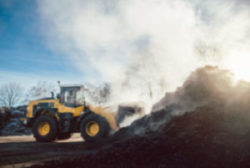
As Ramsey and Washington counties move toward residential collection of food scraps, Ramsey/Washington Recycling & Energy (R&E) is working to ensure that the compost produced from those food scraps can benefit communities. Compost derived from food scraps can benefit gardening and other projects by adding nutrients to soil, encouraging healthy plant growth, increasing moisture retention while improving drainage and much more.
Want to better understand what happens with food scraps when they are dropped off at collection sites? Watch this video (also offered with described audio and subtitles in Spanish, Hmong, Somali and Karen).
Questions related to food scraps compost?
Contact programs@recyclingandenergy.org